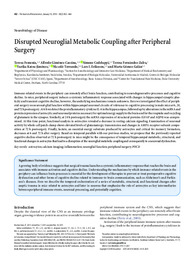Please use this identifier to cite or link to this item:
https://hdl.handle.net/11000/35374Full metadata record
| DC Field | Value | Language |
|---|---|---|
| dc.contributor.author | Femenía Cantó, Teresa | - |
| dc.contributor.author | Giménez Cassina, Alfredo | - |
| dc.contributor.author | Codeluppi, Simone | - |
| dc.contributor.author | Fernández Zafra, Teresa | - |
| dc.contributor.author | Katsu Jiménez, Yurika | - |
| dc.contributor.author | Terrando, Niccolò | - |
| dc.contributor.author | Eriksson, Lars I. | - |
| dc.contributor.author | Gómez Galán, Marta | - |
| dc.contributor.other | Departamentos de la UMH::Farmacología, Pediatría y Química Orgánica | es_ES |
| dc.date.accessioned | 2025-01-28T12:01:48Z | - |
| dc.date.available | 2025-01-28T12:01:48Z | - |
| dc.identifier.citation | Journal of Neuroscience; 2018;38(2): 452-464 | es_ES |
| dc.identifier.issn | 0270-6474 | - |
| dc.identifier.issn | 1529-2401 | - |
| dc.identifier.uri | https://hdl.handle.net/11000/35374 | - |
| dc.description.abstract | Immune-related events in the periphery can remotely affect brain function, contributing to neurodegenerative processes and cognitive decline. In mice, peripheral surgery induces a systemic inflammatory response associated with changes in hippocampal synaptic plasticity and transient cognitive decline, however, the underlying mechanisms remain unknown. Here we investigated the effect of peripheral surgery on neuronal-glial function within hippocampal neuronal circuits of relevance to cognitive processing in male mice at 6, 24, and 72hpostsurgery.At6hwedetect the proinflammatory cytokine IL-6 in the hippocampus, followedupby alterations in themRNAand protein expression of astrocytic and neuronal proteins necessary for optimal energy supply to the brain and for the reuptake and recycling of glutamate in the synapse. Similarly, at 24 h postsurgery the mRNA expression of structural proteins (GFAP and AQP4) was compromised. At this time point, functional analysis in astrocytes revealed a decrease in resting calcium signaling. Examination of neuronal activity by whole-cell patch-clamp shows elevated levels of glutamatergic transmission and changes in AMPA receptor subunit composition at 72 h postsurgery. Finally, lactate, an essential energy substrate produced by astrocytes and critical for memory formation, decreases at 6 and 72 h after surgery. Based on temporal parallels with our previous studies, we propose that the previously reported cognitive decline observed at 72 h postsurgery in mice might be the consequence of temporal hippocampal metabolic, structural, and functional changes in astrocytes that lead to a disruption of the neuroglial metabolic coupling and consequently to a neuronal dysfunction. | es_ES |
| dc.format | application/pdf | es_ES |
| dc.format.extent | 13 | es_ES |
| dc.language.iso | eng | es_ES |
| dc.publisher | Society for Neuroscience | es_ES |
| dc.rights | info:eu-repo/semantics/openAccess | es_ES |
| dc.rights | Attribution-NonCommercial-NoDerivatives 4.0 Internacional | * |
| dc.rights.uri | http://creativecommons.org/licenses/by-nc-nd/4.0/ | * |
| dc.subject | astrocytes | es_ES |
| dc.subject | calcium imaging | es_ES |
| dc.subject | inflammation | es_ES |
| dc.subject | neuroglial function | es_ES |
| dc.subject | peripheral surgery | es_ES |
| dc.subject | POCD | es_ES |
| dc.subject.other | CDU::6 - Ciencias aplicadas::61 - Medicina::615 - Farmacología. Terapéutica. Toxicología. Radiología | es_ES |
| dc.title | Disrupted Neuroglial Metabolic Coupling after Peripheral Surgery | es_ES |
| dc.type | info:eu-repo/semantics/article | es_ES |
| dc.relation.publisherversion | 10.1523/JNEUROSCI.1797-17.2017 | es_ES |

View/Open:
Disrupted Neuroglial Metabolic Coupling after Peripheral Surgery.pdf
2,12 MB
Adobe PDF
Share:
.png)
